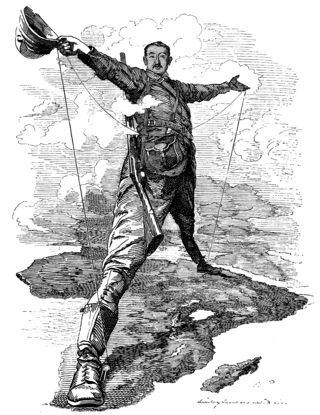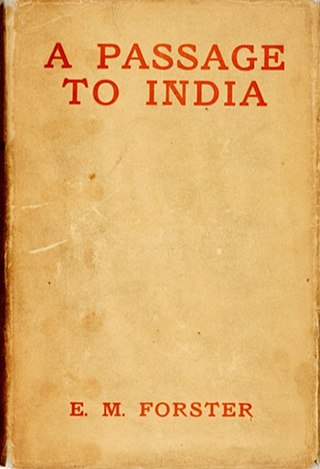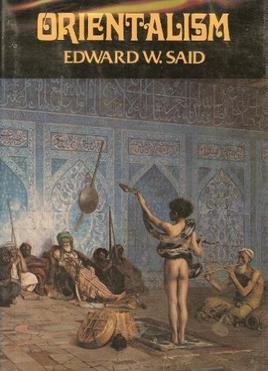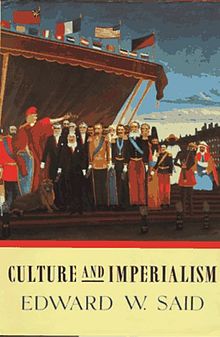Subject
In the work, Said explored the impact British novelists such as Jane Austen, Joseph Conrad, E.M. Forster, and Rudyard Kipling had on the establishment and maintenance of the British Empire, [2] and how colonization, anti-imperialism, and decolonization influenced Western literature during the 19th and 20th centuries. [3] In the beginning of the work, Said claims that the Daniel Defoe novel Robinson Crusoe , published in 1719, set the precedent for such ideas in Western literature; the novel being about a European man who travels to the Americas and establishes a fiefdom in a distant, non-European island. [4]
As the connection between culture and empire, literature has "the power to narrate, or to block other narratives from forming and emerging", which might contradict the colonization of a people. [5] Hence he analyzes cultural objects to understand how imperialism functions: "For the enterprise of empire depends upon the idea of having an empire . . . and all kinds of preparations are made for it within a culture; then, in turn, imperialism acquires a kind of coherence, a set of experiences, and a presence of ruler and ruled alike within the culture." [6]
Imperialism is "the practice, the theory, and the attitudes of a dominating metropolitan center ruling a distant territory." [7] His definition of "culture" is more complex, but he strongly suggests that we ought not to forget imperialism when discussing it. Of his overall motive, Said states:
"The novels and other books I consider here I analyze because first of all I find them estimable and admirable works of art and learning, in which I and many other readers take pleasure and from which we derive profit. Second, the challenge is to connect them not only with that pleasure and profit but also with the imperial process of which they were manifestly and unconcealedly a part; rather than condemning or ignoring their participation in what was an unquestioned reality in their societies, I suggest that what we learn about this hitherto ignored aspect actually and truly enhances our reading and understanding of them." [8]
The title is thought to be a reference to two older works, Culture and Anarchy (1867–68) by Matthew Arnold and Culture and Society (1958) by Raymond Williams. [9]
Said argues that, although the "age of empire" largely ended after the Second World War, when most colonies gained independence, imperialism continues to exert considerable cultural influence in the present. To be aware of this fact, it is necessary, according to Said, to look at how colonialists and imperialists employed "culture" to control distant land and peoples.
Synopsis
Said argues that cultural productions such as literature, music, and art are shaped by the political and economic context in which they are produced. He argues that imperialism has played a significant role in shaping Western culture, and that many works of art and literature can be seen as reflections or products of imperialism.
He also explores the ways in which imperialism has been represented in cultural productions, such as novels and films, and argues that these representations have often been used to justify and perpetuate imperialism. He highlights the importance of examining cultural productions in their historical and political context, and argues that doing so can reveal the complex ways in which culture and power are intertwined. The book covers a range of topics, from the impact of colonialism on the works of Joseph Conrad and Jane Austen, to the ways in which Western films have depicted the East.
Chapter 1. Overlapping Territories, Intertwined Histories
Said says that West has positioned itself as a self-evidently superior, independently developed culture that naturally should share its civilization with inferior others via colonization, which is almost always a product of imperialism. Non-European cultures are therefore assigned a secondary status, which is paradoxically necessary for the supposed primacy of Western culture. Said argues for reading the literary canon with an awareness of these intertwined histories, that support the expansion of Western supremacy.
Chapter 2. Consolidated Vision
Said surveys several canonical works to argue that they support imperialism by the way they ignore or amplify certain narratives including works of Rudyard Kipling, Jane Austen, Giuseppe Verdi and Albert Camus.
Chapter 3. Resistance and Opposition
Resistance to imperialism is often times ignored in the Western narrative, but nevertheless, real. The voice of the colonized is not heard in the colony until independence is achieved. Said critiques the formation of a monolithic nationalism to replace a former colonial polity, instead drawing attention to the diversity and complexity of the individuals in the territory. He posits that peoples have multiple overlapping identities and shared heritage as compared to the divisiveness required by the imperial project.
Chapter 4. Freedom from Domination in the Future
The United States has replaced Europe as the self-appointed guardian of a purported superior Western civilization, and the narratives of European civilizing mission continue to this day with its center in North America. Said laments this development and believes that imperialism will not cease until we understand that no culture can claim to be superior to others, claim international authority, or direct the destinies of inferior others. Said believes that diversity is valuable and complex and cannot be reduced to simple identity symbiology. Said indicts public intellectuals in their silence towards the continuing narrative of Western exceptionalism and superiority. He exhorts them to transcend their national interests and see common interests and values across the rest of the world.

Cultural imperialism comprises the cultural dimensions of imperialism. The word "imperialism" describes practices in which a country engages culture to create and maintain unequal social and economic relationships among social groups. Cultural imperialism often uses wealth, media power and violence to implement the system of cultural hegemony that legitimizes imperialism.

Colonialism is the establishment and maintenance of one group of people as superior to other peoples and areas, often for imperialist control and exploitation, and through a range of practices and relations of colonization, installing coloniality and possibly colonies. That said there is no clear definition of colonialism and definitions may vary depending on the use of the term and context.

Imperialism is the practice, theory or attitude of maintaining or extending power over foreign nations, particularly through expansionism, employing both hard power and soft power. Imperialism focuses on establishing or maintaining hegemony and a more or less formal empire. While related to the concepts of colonialism, imperialism is a distinct concept that can apply to other forms of expansion and many forms of government.

In art history, literature and cultural studies, orientalism is the imitation or depiction of aspects of the Eastern world by writers, designers, and artists from the Western world. Orientalist painting, particularly of the Middle East, was one of the many specialties of 19th-century academic art, and Western literature was influenced by a similar interest in Oriental themes.

A Passage to India is a 1924 novel by English author E. M. Forster set against the backdrop of the British Raj and the Indian independence movement in the 1920s. It was selected as one of the 100 great works of 20th century English literature by the Modern Library and won the 1924 James Tait Black Memorial Prize for fiction. Time magazine included the novel in its "All Time 100 Novels" list. The novel is based on Forster's experiences in India, deriving the title from Walt Whitman's 1870 poem "Passage to India" in Leaves of Grass.

Anglocentrism refers to the perceived cultural, economical, historical, political and social bias, ethnocentrism or dominance in favor of Anglo-Saxon or Anglophone perspectives, often to the marginalization of other cultures in various aspects of global affairs. Historically, the phenomenon stems from the British Empire's extensive influence and the global spread of the English language that often manifests encompassing various aspects of life, including literature, media, politics, and cultural norms on a global scale.
Media imperialism is an area in the international political economy of communications research tradition that focuses on how "all Empires, in territorial or nonterritorial forms, rely upon communications technologies and mass media industries to expand and shore up their economic, geopolitical, and cultural influence." In the main, most media imperialism research examines how the unequal relations of economic, military and cultural power between an imperialist country and those on the receiving end of its influence tend to be expressed and perpetuated by mass media and cultural industries.
Linguistic imperialism or language imperialism is occasionally defined as "the transfer of a dominant language to other people". This language "transfer" comes about because of imperialism. The transfer is considered to be a sign of power; traditionally military power but also, in the modern world, economic power. Aspects of the dominant culture are usually transferred along with the language. In spatial terms, indigenous languages are employed in the function of official (state) languages in Eurasia, while only non-indigenous imperial (European) languages in the "Rest of the World". In the modern world, linguistic imperialism may also be considered in the context of international development, affecting the standard by which organizations like the International Monetary Fund and the World Bank evaluate the trustworthiness and value of structural adjustment loans by virtue of views that are commonly foregrounded in English-language discourse and not neutral.
Postcolonial literature is the literature by people from formerly colonized countries, originating from all continents except Antarctica. Postcolonial literature often addresses the problems and consequences of the decolonization of a country, especially questions relating to the political and cultural independence of formerly subjugated people, and themes such as racialism and colonialism. A range of literary theory has evolved around the subject. It addresses the role of literature in perpetuating and challenging what postcolonial critic Edward Said refers to as cultural imperialism.
A colonial mentality is the internalized attitude of ethnic or cultural inferiority felt by people as a result of colonization, i.e. them being colonized by another group. It corresponds with the belief that the cultural values of the colonizer are inherently superior to one's own. The term has been used by postcolonial scholars to discuss the transgenerational effects of colonialism present in former colonies following decolonization. It is commonly used as an operational concept for framing ideological domination in historical colonial experiences. In psychology colonial mentality has been used to explain instances of collective depression, anxiety, and other widespread mental health issues in populations that have experienced colonization.
Postcolonial feminism is a form of feminism that developed as a response to feminism focusing solely on the experiences of women in Western cultures and former colonies. Postcolonial feminism seeks to account for the way that racism and the long-lasting political, economic, and cultural effects of colonialism affect non-white, non-Western women in the postcolonial world. Postcolonial feminism originated in the 1980s as a critique of feminist theorists in developed countries pointing out the universalizing tendencies of mainstream feminist ideas and argues that women living in non-Western countries are misrepresented.

Other is a term used to define another person or people as separate from oneself. In phenomenology, the terms the Other and the Constitutive Other distinguish other people from the Self, as a cumulative, constituting factor in the self-image of a person; as acknowledgement of being real; hence, the Other is dissimilar to and the opposite of the Self, of Us, and of the Same. The Constitutive Other is the relation between the personality and the person (body) of a human being; the relation of essential and superficial characteristics of personal identity that corresponds to the relationship between opposite, but correlative, characteristics of the Self, because the difference is inner-difference, within the Self.

Orientalism is a 1978 book by Edward W. Said, in which the author establishes the term "Orientalism" as a critical concept to describe the West's commonly contemptuous depiction and portrayal of The East, i.e. the Orient. Societies and peoples of the Orient are those who inhabit the places of Asia, North Africa, and the Middle East. Said argues that Orientalism, in the sense of the Western scholarship about the Eastern World, is inextricably tied to the imperialist societies who produced it, which makes much Orientalist work inherently political and servile to power.
The concept of imagined geographies originated from Edward Said, particularly his work on critique on Orientalism. Imagined geographies refers to the perception of a space created through certain imagery, texts, and/or discourses. For Said, imagined does not mean to be false or made-up, but rather is used synonymous with perceived. Despite often being constructed on a national level, imagined geographies also occur domestically in nations and locally within regions, cities, etc.

Edward Wadie Said was a Palestinian-American academic, literary critic, political activist, and musician. As a professor of literature at Columbia University, he was among the founders of post-colonial studies. As a cultural critic, Said is best known for his book Orientalism (1978), a foundational text which critiques the cultural representations that are the bases of Orientalism—how the Western world perceives the Orient. His model of textual analysis transformed the academic discourse of researchers in literary theory, literary criticism, and Middle Eastern studies.
Postcolonialism is the critical academic study of the cultural, political and economic legacy of colonialism and imperialism, focusing on the impact of human control and exploitation of colonized people and their lands. The field started to emerge in the 1960s, as scholars from previously colonized countries began publishing on the lingering effects of colonialism, developing a critical theory analysis of the history, culture, literature, and discourse of imperial power.

Tropical geography refers to the study of places and people in the tropics. When it first emerged as a discipline, tropical geography was closely associated with imperialism and colonial expansion of the European empires as contributing scholars tended to portray the tropical places as "primitive" and people "uncivilised" and "inferior". A wide range of subjects has been discussed within the sub-field during late 18th to early 20th century including zoology, climatology, geomorphology, economics and cultural studies.

Postcolonial international relations is a branch of scholarship that approaches the study of international relations (IR) using the critical lens of postcolonialism. This critique of IR theory suggests that mainstream IR scholarship does not adequately address the impacts of colonialism and imperialism on current day world politics. Despite using the language of post-, scholars of Postcolonial IR argue that the legacies of colonialism are ongoing, and that critiquing International Relations with this lens allows scholars to contextualize global events. By bridging postcolonialism and International Relations, scholars point to the process of globalization as a crucial point in both fields, due to the increases in global interactions and integration. Postcolonial IR focuses on the re-narrativization of global politics to create a balanced transnational understanding of colonial histories, and attempts to tie non-Western sources of thought into political praxis.
Postcolonial theology is the application of postcolonial criticism to Christian theology. As is in postcolonial discourse, the term postcolonial is used without a hyphen, denoting an intellectual reaction against the colonial, instead of being merely sequential to it.
Cultural archive is a term associated with social anthropologist Wendy James referencing the repository of knowledge found in everyday interactions that individuals reference to validate their existence in the world. This term was coined during James' research of the Uduk people of Sudan in the 1990's.











